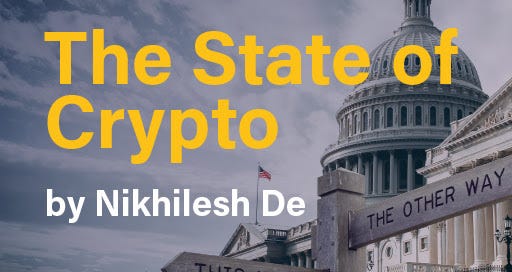Good morning and welcome to the penultimate edition of The State of Crypto: Election 2020. As always, I’m your host Nikhilesh De.
Today’s issue: What role, exactly, does the election play in crypto?

Campaign briefing
Tomorrow is Election Day. All votes should be submitted or postmarked by tomorrow and by sometime Wednesday morning we should have a rough idea of how things are looking, at least at the state, local and most federal elections below the President. At least 94 million individuals have already voted, breaking some records from 2016.
My thesis in thinking about this newsletter was that the crypto space should be more engaged in this election (as I’ve said repeatedly). The time to be talking about these issues is before and during the election process, and not just after a new President and Congress are sworn in next January.
After numerous conversations and dives into public FEC data (watch coindesk.com for an article on that later), I think my thesis still holds fairly well.
Certainly, there's some engagement in the form of direct donations to campaigns and political parties, though not in actively lobbying candidates on policy positions.This makes sense to me: Crypto is a niche, with a questionable reputation to boot. According to FEC figures, the majority of donations either went to a few presidential candidates or to generic party donation platforms like ActBlue and WinRed (ActBlue receiving the majority of these donations). Few donations went to crypto-friendly (or skeptical) candidates at the Congressional level. A crypto-focused Political Action Committee, HODLpac, raised a scant $27,000 since January, only about $6,000 of it since going public in March. Tyler Whirty, the group’s founder, told me he thinks this year's general election cycle has “sucked all the air out of the room when it comes to specific issues” like crypto or even broader tech policy.
Why does it matter? What role does the election play in our industry? Today, not a big one. But this brings us to the next question: What role should the election play? My answer remains: “a much bigger one.”
So, and I say this as a skeptic of much of the crypto space, there is still potential for growth.
This is, of course, different from the question of “what sort of role does crypto play in the presidential election.” In 2020, the answer was “literally none.” It wasn’t a campaign issue, even though technically at least two major crypto figures declared their intention to run (and one ended up arrested) and another third-party candidate brought it up. I doubt this will change unless the industry does actually become more engaged with the regulators and lawmakers. It can’t just be the Washington, D.C.-based nonprofits and lobbying organizations, but the actual developers and entrepreneurs.
It’s looking increasingly likely that, barring any electoral shenanigans, Democrats will control the House of Representatives, Senate and Presidency, which means there could be a coordinated effort to enact financial and technology regulation that will affect the cryptocurrency and blockchain space. And again, this doesn’t mean crypto-specific legislation (unless Libra?) but rules around the broader questions of encryption, digital identity and privacy, banking, financial access and even net neutrality.
There are people in the crypto industry building tools that touch on all of these issues. They should talk to their representatives.

Fast fact


On the ballot
A number of this year’s candidates for federal office have proposed crypto-related bills or suggested policies. Meet a few of them, courtesy of my colleague Sandali Handagama:
Rep. French Hill (R-AK)
Crypto stance: Pro-blockchain, CBDC proponent
Rep. Hill, a third-term congressman, wrote a letter to Federal Reserve Chair Jerome Powell with Rep. Bill Foster asking the government to consider a national digital currency. He is a member of the Congressional Blockchain Caucus. In a video interview with Yahoo Finance, Hill stated that blockchain tech is part of the future.
Rep. Ro Khanna (D-CA)
Crypto stance: Pro-blockchain
Rep. Khanna, a second-term congressman, is a member of the Congressional Blockchain Caucus. He was among the 11 lawmakers that signed a letter to Treasury Secretary Steven Mnuchin to consider blockchain technology for streamlining the distribution of funds and supplies to those in need during the Covid-19 pandemic. He also signed a letter addressed to the federal government, urging the administration to use blockchain solutions in pandemic relief efforts.
Rep. Ben McAdams (D-UT)
Crypto stance: Pro-blockchain, anti-Libra
Rep. McAdams, a first-term congressman, signed a 2020 letter to the US Treasury Secretary Steven Mnuchin, calling for the department to use blockchain technology to streamline pandemic relief efforts. He also signed a similar letter addressed to President Trump and federal officials months later. He is a member of the House Financial Services Committee’s fintech task force. McAdams has been critical of Facebook in the past, arguing that Libra might enable child exploitation by protecting predators.
Rep. Kathleen Rice (D-NY)
Crypto stance: Wary (?)
Rep. Rice, a third-term congressman, introduced the Homeland Security Assessment of Terrorists’ Use of Virtual Currencies Act in 2019. The bipartisan bill passed the house, and requires the department of homeland security (DHS) to develop a threat assessment report on virtual currency use by terrorist organizations. The bill was co-sponsored by Reps Peter King (R-NY), Brad Sherman (D-CA) and Van Taylor (R-TX).
Rep. Jerry McNerney (D-CA)
Crypto stance: Pro-blockchain
Rep. McNerney, a seventh-term congressman, signed a 2020 letter to U.S. Treasury Secretary Steven Mnuchin, calling for the department to use blockchain technology to aid pandemic relief efforts and the distribution of relief funds. He also signed a letter to President Trump, explaining the benefits of blockchain in streamlining administrative processes.

Early returns
Prediction markets are an effort to create better polling by ensuring participants have “skin in the game,” by asking them to actually bet money on the outcome of an event, such as an election. There isn’t a huge market, as my colleagues Benjamin Powers and Brady Dale wrote last month. But people are betting real money, either on centralized prediction markets or on decentralized platforms using tokens.
CoinDesk is monitoring crypto prediction markets to see how they align with traditional polls and the final election results.
Here’s what a random sampling of markets says (as of Nov. 1, 2020):
Centralized markets:
PredictIt: Joe Biden (D) has the best odds of winning the presidency.
Iowa Electronic Markets: Democrats are likely to receive the majority of the popular votes.
Decentralized markets:
Polymarket: Donald Trump (R) will not win the 2020 U.S. presidential election.
Augur: Donald Trump (R) will not be re-elected in 2020.
PrediQt: Donald Trump (R) will not be re-elected in 2020.
FTX: Traders have bet more on Biden winning than on Trump winning.
Neutral polling:
FiveThirtyEight: Biden is favored to win the presidential election.

Sounding board
Feel free to reply any time or email social@coindesk.com or nik@coindesk.com.
Between reads, or to talk about the polls as they start rolling in, chat with us on Telegram.


